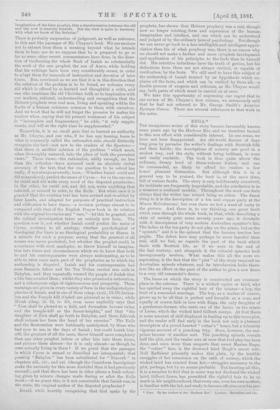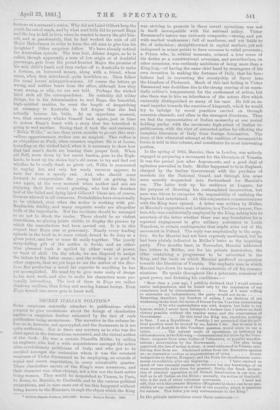ENGA.*
THE anonymous writer of this story became favourably known.. some years ago by the Harbour Bar, and we therefore turned. to this new effort with considerable interest. In one souse, we- have not been disappointed. An old-world flavour of days long gone by pervades the writer's dealings with Scottish folk and their habits ; the descriptions of scenery are good in a modest way, and the style, without being brilliant, is evert and easily readable. The book is thus quite above the ordinary, dreary level of three-volume fiction, and can be commended, as likely to afford its readers a few hours' pleasant distraction. But although this is in a- general way to be praised, the book is, at the same time full of serious faults. The story is only indifferently conceived,. its incidents are frequently improbable, and the conclusion is in a measure a confused muddle. Throughout the work one feels always that the writer has missed being an artist. The finest thing in it is the description of a tea and supper party at the Misses Malcolmsons', but even there we feel a want of unity fir the picture. And there is, to our thinking, one great fault which runs through the whole book, in that, while describing a state of society gone some seventy years ago, it dovetails with it descriptions of very modern Australian squatter's life. Theladies at the tea-party do not play on the piano, but on the " spinnet," and it is the spinnet that the heroine teaches her pupils. The defect here may perhaps be more fanciful than real, still we feel, as regards the part of the book which' deals with Scottish life, as if we were iu the end of the last century, and alongside it the colonial episodes look incongruously modern. What makes this all the more ex- asperating, is the fact that the " plot " of the story required no Australian episode whatever, and its introduction looks there- fore like an effort on the part of the author to give a new dress to a very old romaucist's device.
The bases on which the story is constructed are common- place in the extreme. There is a wicked squire or laird, whd, has spirited away the rightful heir of the estates— a boy, the fruit of a concealed marriage. The boy, as a matter of course,. grows up to be all that is perfect and loveable as a man, and' equally of course falls in love with Enga, the only daughter of
gentleman-farmer,'who rents one of the farms on the estate of Lorne, which the wicked laird Gilbert usurps. At first there- is some amount of skill displayed in leading up to this tame plot,. and the reader will find early in the book not only a pleasant description of a proud-hearted " cottar's " home, but a tolerably. vigorous account of a poaching fray. Soon, however, the sur- prises become of another sort. The poaching episode reve.alis half the plot, and the reader sees at once that foul play has been done, and soon more than suspects that sweet Marian Enga; the " cotter " lass, is the drowned laird Hugh's secret wife:. Nell Raffaleur presently makes this plain, by the terrible struggles of her conscience on the oath of secrecy, which the wicked laird has exacted from her,—struggles necessary to the plot, perhaps, but by no means probable. But knowing all this it is a surprise to find that in some way not disclosed the wicked laird, Gilbert Innes, has permitted the rightful heir to be so much in his neighbourhood, that every one, even his own mothers. is familiar with the lad, and ready to become effusive over his per-
* Enya. By the Author of the" Harbour Bar." Loudon : Macmillan and (Jo, fections at a moment's notice. Why did not Laird Gilbert keep the youth far out of reach, and by what mad folly did he permit Enga and the boy to fall in love, when he wanted to marry the girl him- self, and so passionately, that he had worked the ruin of old Major Malcolmson in order to force the old man to give him his daughter P Other surprises follow. We have already noticed the Australian episode. The true heir, Mister Angus, as he is called, though apparently a man of low origin or of doubtful parentage, gets from the proud-hearted Major the promise of his only child's hand, and then rushes off to Australia to make a fortune, on borrowed money, along with a friend, whose name, when first introdaced, quite bewilders us. Then follow the usual lovers' misapprehensions. Of course the letters go wrong, and neither hears from the other, although how they went wrong, or why, we are not told. Perhaps the wicked laird stole all the correspondence. He certainly did wilder things, for in his determination to wed Enga, the beautiful, high-spirited maiden, he went the length. of despatching an emissary to Australia to tell Angus that she had actually become his bride. At an opportune moment, too, that emissary whisks himself back again, just in time to poison Enga's heart with a story that her betrothed is going to wed another. Seeing that it took the said emissary, " Birkie Willie," no less than seven months to go out, this mar- vellous opportuneness strikes one as magical. This ruffian is as ubiquitous as Puck, when occasion requires. He is at Lerue, hounding, on the wicked laird, when it is necessary to show how that bad man's deeds are bearing their proper fruit. When old Nell, worn down by her secret burden, goes to the High- lands, to hunt up the stolen boy's old nurse, to try and find out whether he be really dead, as given cut, Willie is summoned to waylay her, and only her ready resource appears to save her from a speedy end. And. who should come forward to congratulate the young laird on getting his own again, at the very moment when mother and son are enjoying their first covert greeting, who but the drunken tool of the foiled and dying laird Gilbert P There are, of course, licences allowed in all romances. Probabilities have occasionally to be violated, even when the writer is working with pre- Raphaelite fidelity, and many exquisite works are altogether built of the improbable. But the incidents should be managed so as not to shock the reader. There should be no violent transitions, no glaring joints visible, to display the process by which the manufacture had been carried out. It is in this respect that Enga sins so grievously. Nearly every leading episode in the hook is, to some extent, forced to do duty at a given point, and few or none fit easily together. The purely story-telling gift of the author is feeble, and an other- wise pleasant book is spoiled by either want of power, or want of skill. On the whole, we are disposed to assign the failure to the latter cause ; and the writing is so good in other respects, that we yet hope to see the author of the Har- bour Bar producing a novel far superior to anything he has yet accomplished. He must try to give more unity of design to his next work, and also to make his characters more per- sonally interesting. The best of them in El/9a are rather shadowy outlines, than living and moving human beings. Even Enga herself one never gets to know well.



































 Previous page
Previous page